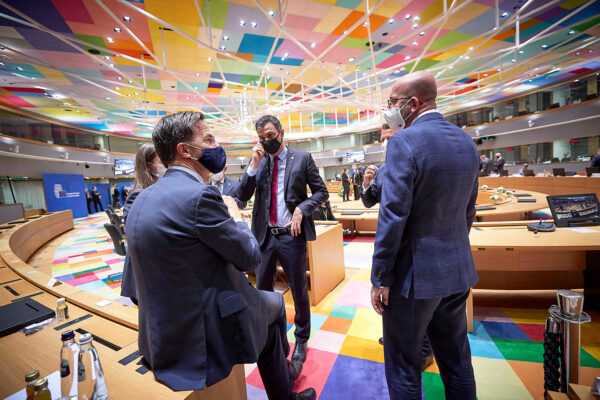
Less than a year ago, Mark Rutte and Pedro Sánchez were on opposite ends of the debate about the EU’s coronavirus recovery fund. Sánchez and other Southern European leaders called for grants financed by EU-issued bonds. Rutte and his allies preferred loans. The two sides eventually split the difference.
Now the two prime ministers, one center-right, the other center-left, have made common cause for a version of European “strategic autonomy” that is more liberal than Emmanuel Macron’s.
In a joint “non-paper“, the Dutch and Spanish leaders endorse strategic economy as a means to an end — growth and security — but not an end in itself. They caution it mustn’t become an excuse for isolation and protectionism.
Openness
Rutte and Sánchez share Macron’s analysis that Europe has become too reliant on American big tech and Chinese raw materials. Their proposals include developing a European digital payment solution and monitoring, and possibly prohibiting, foreign investments in key industries.
But they emphasize competitiveness and openness to the world whereas Macron’s vision — endorsed by Germany — is more inward-looking:
- Strengthening the single market by removing barriers to businesses and labor, improving enforcement and ensuring fair and effective taxation.
- Setting international digital standards, developing common cybersecurity criteria and rolling out 5G Europe-wide.
- Trade agreements that contribute to sustainable development and enhance the resilience of European supply chains.
Less concrete ambitions include harmonizing educational standards, improving access to credit and investing in batteries and hydrogen.
Earlier proposals
These match proposals Rutte made with Central and Northern European leaders in 2019:
- Completing the single market in services.
- Removing barriers to labor mobility, including through mutual recognition of professional qualifications.
- Setting global standards in artificial intelligence and the digital economy.
- Strengthening European capital markets to enable cross-border risk-sharing.
- Transitioning to a green economy.
Protectionism
When the European Commission blocked a merger of the French and German train manufacturers Alstom and Siemens in 2019, Macron convinced Angela Merkel to join his call for relaxing EU competition rules to allow state aid and big mergers, and to keep out unwanted foreign investment.
Macron also argued for adopting a European preference in public contracts and sanctioning international companies that don’t respect European data-protection and environmental regulations.
The COVID-19 pandemic has lent credence to his agenda. Dependencies on Chinese-made masks and British vaccines have proved unreliable. Rutte used to oppose reining in competition from state-backed enterprises and subsidizing their European competitors. Not anymore.
But he and Sánchez remain wary of a lurch into protectionism.
No more Mr No
The unlikely alliance is reminder that Rutte, stereotyped as Europe’s frugal-in-chief, is more pro-European than his critics allow.
Europhiles are prone to label anyone who doesn’t share their vision for the EU as “Euroskeptic”. They criticize Rutte for resisting a eurozone budget, European tax harmonization and eurobonds.
But it’s not “more Europe” Rutte opposes; it’s a Europe that would become less competitive and more dependent on transfers from the wealthier member states to the poor.
His vision, now also Sánchez’, of a Europe that is open to — and confident of its place in — the world sounds far more attractive.
